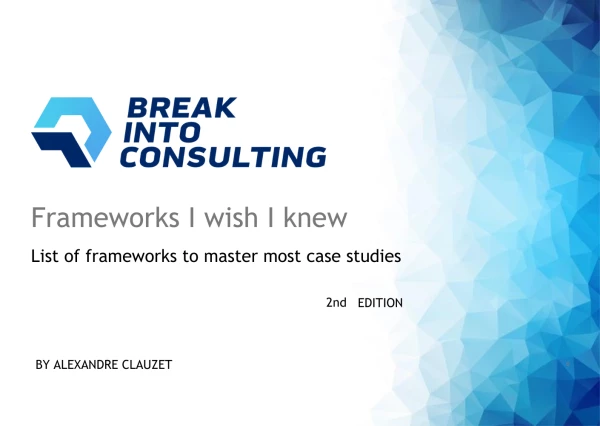After speaking to countless people in the industry and watching videos on the topic, I genuinely can say I haven't gotten a clear answer on how much time it's ok to take on your frame work and other sections (brainstorming, etc). For example, I've heard some people say it's totally fine to take 3+ on brainstorming and ask from time on almost every question asked, while others say that you should keep everything as short as possible. I know the answer to this is going to be something along the lines of "it depends", but any comments on this would be much appreciated!
How long should you be taking to think in case interviews


Focus on the outcome, not on the process.
The interview should replicate a natural interaction between two people, up to a point that of a client and a consultant, or a manager and a junior team member.
So how does this happen in real life? Sometimes you just know the answer. In other occasions you have to think about it more thoroughly. In the former you don't take time, in the later you do.
What really matters is that your answer has quality.
_____________________________________________________________________________
Having said this, I understand your concern, and let me give you a "rule of thumb" on taking time vs. not taking time:
- If it is a complex question, or one of the following parts of the case (structuring an approach; providing an equation for a market estimate; or a "brainstorming" question; or exhibit interpretation) in general you should take some time.
- Otherwise, more likely it is a simple question and a simple explanation (or speculation) will be enough.
_____________________________________________________________________________
And if you take time... how long can you take?
Yes, you are right, it depends. It depends on the complexity of the question:
- For an approach, you may need 2 minutes.
- For a market estimate most likely 1-1.5minutes is enough.
- For a brainstorming question less than 1 minute to note down some quick ideas and optionally consider a structure
- For exhibit interpretation... 1 minute should be enough as well, but that also depends on how much information you have... very simple graphs 30 seconds are enough, very complex you will need more than one minute.
Do you agree with this approach?

Totally get the confusion. Let me give you a simple rule that’s worked really well for me, both as an interviewer and interviewee:
- For structuring questions or medium/high-complexity ones (like brainstorming): Always ask, “Can I take some time to gather my thoughts?”
- For straightforward or follow-up questions (e.g., “What do you think of this number?”): Answer right away—no need to pause.
- If you’re unsure which it is, ask anyway. Worst case, the interviewer says, “No need, go ahead.” It won’t hurt you.
This keeps you clear, respectful of the format, and shows good judgment.

Hi there!
Two things influenciate this answer: what session of the case we’re talking about and what is the complexity of this part.
- For initial structure, always ask for time. You can take up to 5min if it is a complex case (e.g.: non conventional one or one with multiple data)
- For math, always ask for time to structure your equation/diagram/table. Probably 2min is enough time
- For exhibits, read out loud what you’re seeing (and voice that you’re doing this), and either ask for time to organize your insights or say right away. 1min should be fine.
- For brainstorm, which may be the first part of the case, you may ask for 2-5min (depending on the complexity), but if it is a simple question, you may do it on spot.
- For recommendation you should be able to do it without timing.
The more time you take, the more the interviewer will expect from your answer. Taking 5min to present a mediocre structure or incomplete equation is a bad sign.
It seems you need professional guidance to be more confident on how to tackle a case properly. Let me know if a 20min free introductory call would help you decide if that is the case.
Best,
Mari

There are a couple of answers on this similar question: https://www.preplounge.com/en/consulting-forum/showing-spontaneous-quality-vs-pause-time-and-thorough-answers-22403
Here was my answer for that question, which applies here:
Regarding the two approaches to answering a question:
1. Answering on the fly vs.
2. Saying "Please give me 30 seconds" and responding more thoughtfully — I think it’s best to be flexible. At the end of the day, what really matters is whether your answer is good.
Personally, I prefer approach 2, but I vary the time depending on the situation.
For creative questions, which I really enjoy, I find it easy to brainstorm. I usually take around 10 seconds to come up with three rough "buckets" to frame my structure, and then I freestyle from there.
For numerical questions or the initial structuring part of a case, I take a bit longer — usually around a minute to a minute and a half — to write out my thoughts and organize my answer clearly.
From an interviewer’s perspective, the bottom line is: if your answer is strong, well-reasoned, and insightful, the amount of time you take (or don’t take) doesn’t really matter. What’s important is making sure your interviewer can:
- Follow your logic
- Understand your structure and thinking process
But try not to take more than 3 minutes. I've always found it a little bit too long a silence, if you do need to go over 3 minutes, try to talk through your logic or thinking.

Hi there,
You’re raising an important point about balancing quick thinking with structured responses in case interviews. The reality is that interviewers value both spontaneity and structured thinking, but the right approach depends on the type of question being asked. Here’s how to navigate this effectively:
1. When to Answer Quickly
There are situations where a fast, confident answer is a positive signal. These include:
• General business knowledge questions – e.g., “What are some common revenue streams for a SaaS company?” A quick and well-informed response shows strong commercial awareness.
• Clarifications or definitions – If asked, “What is EBITDA?” a straightforward answer without hesitation is expected.
• Obvious brainstorming prompts – If the question is broad and calls for intuitive responses (e.g., “What factors would you consider when pricing a new consumer app?”), showing fluency in business thinking is beneficial.
2. When to Take a Brief Pause
For more complex or layered questions, a short pause (3-5 seconds) to organize your thoughts is preferable. These include:
• Deep-dive brainstorming questions – If asked, “What factors should a private equity firm consider before acquiring a mid-sized logistics company?” it’s better to structure your response (e.g., market, financials, operational synergies) rather than listing random ideas too quickly.
• Quantitative logic-based questions – If a question requires logical sequencing (e.g., “How would you estimate the impact of a 10% price increase on demand?”), taking a second to frame your approach is advisable.
• Unexpected or tricky questions – If the interviewer throws a curveball, pausing briefly shows that you’re being thoughtful rather than just reacting.
3. Should You Stick to One Approach or Stay Flexible?
Sticking rigidly to one method (always answering immediately or always pausing) isn’t ideal. The best candidates adjust their approach dynamically based on:
• The complexity of the question
• The context of the discussion
• The interviewer’s style (some prefer concise, instinctive answers; others appreciate deeper structure)
A good middle way is to develop a habit of briefly structuring your thoughts before responding—without overcomplicating it. For example:
• If the question is simple, respond quickly and confidently.
• If it’s more complex, say something like: “Let me break this down into a few key areas…” or “Let me take a second to structure my thoughts.” This buys you a few moments without awkward silence.
4. What Do Interviewers Prefer?
Most professional interviewers expect a mix of both approaches:
• Partners and senior interviewers often appreciate clear, structured responses—they want to see that you can break down complex problems logically.
• Junior interviewers (managers, consultants) may focus more on quick thinking and fluency, as they often assess commercial awareness and business intuition.
Aim for a balanced approach:
• Answer simple, intuitive questions quickly and confidently.
• Take a moment to structure your thoughts for complex or layered questions.
• Use a brief verbal cue (e.g., “Let me break this down…”) to buy yourself thinking time naturally.
• Observe your interviewer’s style and adjust accordingly.
Mastering this flexibility will make your responses feel both spontaneous and well-thought-out, which is exactly what top-tier consulting firms look for.
Hope this helps! Let me know if you’d like to discuss specific examples.
Best,
Evelina

Hi,
Try to answer 'simple' questions on the spot in a structure way.
For more complex questions, you can ask time and take up to 30s as a rule of thumb.
Mattijs

Hey there 😊
You're totally right that the answer is “it depends”—but here’s a clearer breakdown that might help:
🧠 Framework / Structure: Aim for around 1.5 minutes, max 2 if it’s complex. You can ask for time to think here—it’s normal and even expected. Just be confident when you come back in.
💡 Brainstorming questions: You want to sound sharp and structured. Take a few seconds to think silently (10–20 sec), then say “Here are a few areas we could look into…” and talk through your buckets. It shouldn’t take 3+ minutes—1–2 is usually enough to get your ideas out and sound thoughtful.
📊 Math: Take the time you need to get it right, but talk your logic through so the interviewer stays engaged and knows where you're going.
⏸️ Asking for time: It’s fine to pause strategically, but don’t overuse it. Interviewers look for people who can think under pressure and communicate clearly.
🎯 Overall: Be concise, structured, and confident—even if you’re not sure. That’s what they’re testing more than the “perfect” answer.
Let me know if you want to practice this together—happy to help you refine timing & structure!
Best,
Alessa 🌟

Hi,
For any interview, it is important to keep the back and forth spontaneous. Thus, if there are big or frequent pauses, it negatively impacts the flow of the interview with risks of interviewer losing interest.
Thus, the bottom line, ask for time only when you absolutely need it. Few pointers:
1. Asking for time for creating a framework is normal. Also remember, this is at the beginning of the interview and will build the framework based on which you will solve the case. So the interviewer is expecting you to spend some time to think here. Having said that, anything more than 2-3 mins will be considered too long unless the framework is very complex, which is seldom the case.
2. For the rest of the case, ask for time to think only when it is absolutely required. So for example, if you are looking at a complex chart, it is okay to ask for time to analyze it. But if it is a simple chart, then you should try to read it as part of the conversation.
Another example could be if you are asked a question that may require a mini framework. For example, what type of costs could be incurred? In general, you should not ask for time for such a question since it ir relatively simple and could break the flow of the case solving process. So you may want to list a few that come to mind, and ask if they want you to go more deep in which case you can ask for some time.
In general, use your common sense with the guideline that ask for time only if you absolutely need it due to the complexity of the problem.
Hope this helps!
Thanks,
Soh

Hi there,
Rough guideline (not hard rules - no interviewer is sitting there with a stop watch):
- Framework: 1.5 - 2 minutes
- Chart: 1 minute
- Math logic: 1 minute
- Math execution: 2-3 minutes
A couple of pointers:
- Some interviewers don't allow any time to stress-test
- McKinsey generally allows a bit more time
- The time you take to think should correlate with the quality of your content
Cheers,
Florian

Hi there,
Sharing my thoughts as interviewer here. I think it is okay to ask for sometime to think for every key, or transitional question asked. Examples of such questions could be a framing / structure question, the beginning of a brainstorming, or a synthesis of the case etc. Don't ask time for the most simple, straightforward question (e.g., when asked to explain your math approach which you've already gone through the calculation).
In terms of the time allowed to think through such key, transitional questions, I'd say ideally keep it within 2.5 minutes. Better don't go over 3. It takes time to practice, but it can be done.
Best,
Emily














